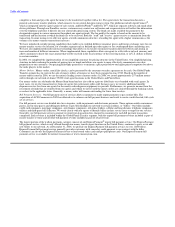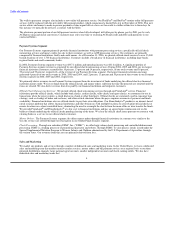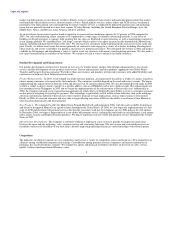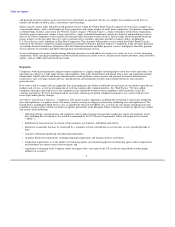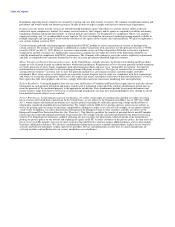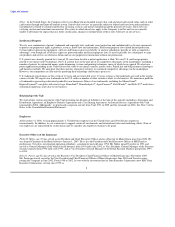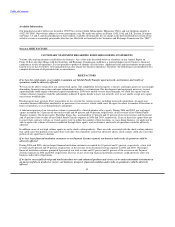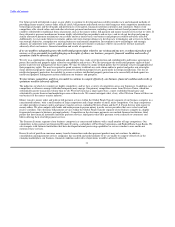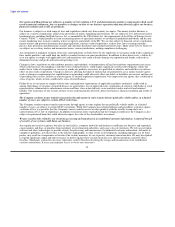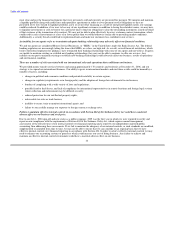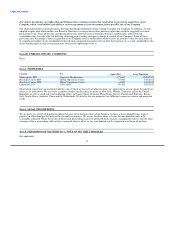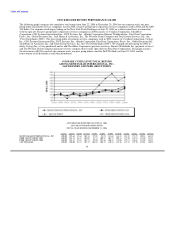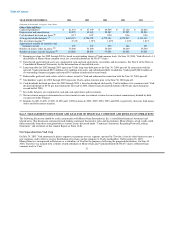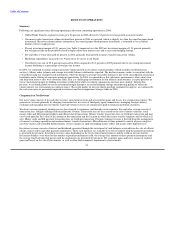MoneyGram 2006 Annual Report Download - page 16
Download and view the complete annual report
Please find page 16 of the 2006 MoneyGram annual report below. You can navigate through the pages in the report by either clicking on the pages listed below, or by using the keyword search tool below to find specific information within the annual report.
Table of Contents
systems or databases, they may be able to steal, publish, delete or modify confidential customer information. A security breach could lead
to reputational harm and make our customers less confident in our services.
Our business involves the movement of large sums of money, and, as a result, our business is particularly dependent on our ability to
process and settle transactions accurately and on the efficient and uninterrupted operation of our computer network systems and data
centers.
Our ability to provide reliable service largely depends on the efficient and uninterrupted operation of our computer network systems and
data centers. Our business involves the movement of large sums of money. Our revenues consist primarily of transaction fees that we
charge for the movement of this money and investment revenues. These transaction fees represent only a small fraction of the total
amount of money that we move. Because we are responsible for large sums of money that are substantially greater than our revenues, the
success of our business particularly depends upon the efficient and error-free handling of the money that is remitted to us and that is used
to clear payment instruments or complete money transfers. We rely on the ability of our employees and our internal systems and
processes to process these transactions in an efficient, uninterrupted and error-free manner. In addition, we rely on third-party vendors in
our business, including clearing banks which clear our money orders and official checks and certain of our telecommunications providers.
In the event of a breakdown, catastrophic event (such as fire, natural disaster, power loss, telecommunications failure, or physical break-
in), security breach, improper operation or any other event impacting our systems or processes or our vendors' systems or processes, or
improper action by our employees, agents, customer financial institutions or third party vendors, we could suffer financial loss, loss of
customers, regulatory sanctions and damage to our reputation. The measures we have enacted, such as the implementation of disaster
recovery plans and redundant computer systems, may not be successful and we may experience problems other than system failures. We
may also experience software defects, development delays and installation difficulties, which would harm our business and reputation
and expose us to potential liability and increased operating expenses. Certain of our agent contracts, including Wal-Mart, contain service
level standards pertaining to the operation of our system, and give the agent a right to collect damages and in extreme situations a right of
termination for system downtime exceeding agreed upon service levels. If we face system interruptions and system failures our business
interruption insurance may not be adequate to compensate us for all losses or damages that we may incur.
We face credit and fraud risks from our retail agents.
The vast majority of our Global Funds Transfer business is conducted through independent agents that provide our products and services
to consumers at their business locations. Our agents receive the proceeds from the sale of our payment instruments and money transfers
and we must then collect these funds from the agents. As a result, we have credit exposure to our agents, which averages approximately
$1.2 billion in the aggregate, representing a combination of money orders, money transfers and bill payment proceeds. During 2006, this
credit exposure was spread across almost 29,000 agents, of which 13 owed us in excess of $15.0 million each at any one time.
We are not insured against credit losses, except in circumstances of agent theft or fraud. If an agent becomes insolvent, files for
bankruptcy, commits fraud or otherwise fails to remit money order or money transfer proceeds to us, we must nonetheless pay the money
order or complete the money transfer on behalf of the consumer. Moreover, we have made, and may in the future make, secured or
unsecured loans to retail agents under limited circumstances or allow agents to retain our funds for a period of time before remitting them
to us. The failure of agents owing us large amounts to remit funds to us or to repay such amounts could materially adversely affect our
business, results of operations and our financial condition.
An increase in fraudulent activity using our services could lead to reputational damage to our brand and could reduce the use and
acceptance of our services.
Criminals are using increasingly sophisticated methods to engage in illegal activities such as fraud and identity theft. As we make more
of our services available over the internet we are subject ourselves to new types of credit and fraud risk, as requirements such as customer
authentication are more complex with internet services. If fraud levels involving our services were to rise, it could lead to regulatory
intervention and reputational and financial damage to our brand. This in turn could reduce the use and acceptance of our services and/or
increase our compliance costs, and thereby have a material adverse impact on our business, financial condition and results of operations.
13


